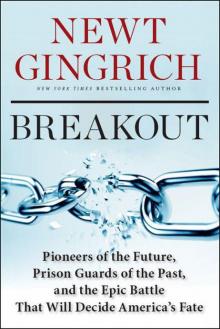- Home
- Newt Gingrich
1945 Page 3
1945 Read online
Page 3
"Well, I'm pretty sure she hasn't passed me, so she probably went this way," Jim replied, pointing down the street, and the two set off as if in pursuit, pushing their way through the crowd, forcing their tail, whoever he was, to fall behind.
"We won't be seeing each other again for some time," Wilhelm whispered.
"Why, are we under suspicion?"
"Not 'we.' It's you. Certain people are more interested in you than they should be. Apparently there's something in the works to damage you. That's all I know."
"Me? Just me? You're my only contact!"
"I don't have any details and we don't have time to go into it," Wilhelm replied quickly. "Just be careful."
"Careful about what?"
"I don't know. Some kind of set-up maybe."
Clearly Willi was worried for him, which added weight to his next words: "But that's minor compared to the other. Something big is up. We don't know what, but security has been tightened. Also, training schedules for units inside Russia have gone to a wartime footing, and secret amphibious and airborne assaults are being rehearsed on the shore of the Black Sea."
He slowed down for a moment, turning around as if looking for his fiancee and then took off again, with Jim following. "Even Canaris is in the dark on this," he whispered. "Internal security is higher than it was before Operation Barbarossa." Barbarossa had been the code name for the launch phase of the Reich's attack on the
Soviet Union in '41. "Expect some major code changes at the highest levels in the near future, also some—what's the English phrase? False ... herrings?"
Despite the tension, Martel couldn't help his smile.
"Don't trust anything you hear — and not just you personally. Your entire intelligence system can expect to be the target of major spoofing.
"Oh. And one more thing. The entire operation, whatever it is, is code-named Arminius.'"
"It's definitely aimed toward us?"
"We think so, but we're not sure. Jim, this is our last contact for a long time. Canaris ordered me to break off with you now so that he won't be questioned later about my part in the failed effort to turn you."
Jim nodded, smiling as if the two were exchanging a casual pleasantry.
Wilhelm looked past Jim, as if seeing something else.
"I think that's Lori over there," he announced, and he started to move away. Wilhelm paused and looked back, his blue eyes filled with a distant melancholy. "If you should ever get a message from me inquiring about your father, it's a clear warning that the show's about to start. Remember that, and . . . take care, my cousin." He reached out, squeezed Jim's hand, and disappeared into the crowd.
Jim made a studied effort to appear as if nothing at all had transpired between him and his cousin other than a friendly chat while looking for a misplaced girlfriend. Slinging his camera bag over his shoulder, he continued down the thoroughfare, pausing for a moment to look in a shop window where the new television sets were on display.
Berlin had opened the worlds first full-time television station the month before, and a crowd was gathered around the window watching an old propaganda film about the start of the war with Russia four years ago. The image was grainy, and the picture tube no more than a hand's span across, but even so it had a certain hypnotic quality.
One of Jims assignments was to track down leads on a rumored Nazi superweapon, which mated a television camera and maneuvering fins to a rocket bomb. The resulting weapon would be remotely guided to its target. ... If the Nazis had managed such a trick they had also ushered in a revolution in warfare straight out of science fiction. He watched the picture, trying to image how a maneuvering target — such as, say, a US aircraft carrier, would look on the grainy screen.
After a minute or two he turned and continued on, pausing here and there to look in shop windows that were again filled with goods. Gasoline, rubber products, and anything that required copper, brass, or aluminum were still impossible for ordinary folk to find, but the food markets overflowed with loot: Russian sausages, bread, and vodka (which had become the cheap hard liquor of Germany); fruit from the Black Sea region; French wines and the latest Parisian fashions. Even silk stockings were coming back, though they generally sold out in a few hours.
Sadly, Jim had noted that hemlines were dropping again. To his mind the effect on hemlines of the tight rationing of cloth had been one of the few real wartime benefits, both in Europe and America.
But despite the lowering hemlines the people around him seemed relaxed and happy; clearly they were enjoying the fruits of German victory — even though, Martel supposed, they could not help noticing that there were far more female celebrants than male.
Other social changes the war had created were evident as well. Under Speer s wartime economy program, rushed into effect within days of Hitler's accident, German women had filled the factories. Germany had still been playing a guns-and-butter game up until then, but instantly when given the opportunity, Speer had changed that. Within eighteen months, the most essential military production was up three hundred percent, and the majority of the labor force was female, something previously unthinkable.
Women controlled the money now and spent it as they pleased. Jim wondered how, if Germany ever did demobilize, these women would react when the former masters of the house came back home and tried to reassert control.
As he passed a beer garden, loud and boisterous singing rioted through the open doors from an interior packed with soldiers in a happy mood after the parade. He continued on with the flow of the crowd, sensing from them the same self-satisfied contentment that emanated f rom crowds going home after Fourth of July and Labor Day picnics.
Martel wondered how that could be. How could they not know of the horrors being perpetrated in their name all over the Reich and in the conquered territories? Slave labor starved in the East while working to fill Berlin shops. Tens of thousands were dying of overwork, malnourishment and exposure as they labored like the captives of Pharaoh on the new Autobahn extensions that were pushing deeper and deeper into the Ukraine and Occupied Russia. And worst of all, the camps. On the other hand, in a climate where no one dared speak "sedition" except to their closest, oldest friends, information flow would be very slow. Especially if people did not want to know. But sooner or later murder would out, the atrocities become common knowledge. What of German pride then?
Coming to the corner that housed his destination, Martel turned from the boulevard and its obscene canopy of swastikas to Old Glory where it waved above the American Embassy. As ever, he felt a certain relief at the transition to American soil, symbolic though it was. Going through the outer doors, he returned as crisply as they were proffered the salutes of the Marine guards, stepped into the main corridor, and turned to sign in at the receptionist's desk, where to his surprise Betty was waiting to meet him.
"Hi, Betts. What are you doing out here?" Normally at this time of day Betty would be busy keeping the intelligence section of the embassy running. She was one of those incredible private secretaries who wind up running the show. "Sharon sick again?"
"They asked me to sit out here, so here's where I'm sitting. How was the parade, Commander?"
"The usual," he replied as he leaned forward to scribble his name. "Lots of brass bands and marching around." Much more quietly he added, "Wait till you see the pics. If this doesn't wake people up, I don't know what could." Jim was being mildly out of line talking with her even in such vague terms, not because she shouldn't know but because they were arguably in a public place, deserted though it was.
Betty McCann looked up at him with a smile. "Hey, Lover, one lieutenant commander, even one as gorgeous as you, can't take the whole weight of national defense policy on his shoulders."
When he hardly smiled in return, nor reminded her that though they might have an understanding they were not lovers, and by the way why not? she too turned serious. "You and I have gone over the specs for those planes, Honey. As far as our side is concerned we wrote th
e book on German jets. You've even drawn schematics. Surely just seeing them in flight didn't add that much?"
"Seeing them made it real. Betty, I'm telling you. We're in trouble, and if we don't wake up to that fact and do something about it, we could wind up fighting a war in the continental USA."
"Jim, it's not that bad."
"Not quite. Not yet."
For a moment Betty seemed at a loss for words, as if she wanted to reassure him, but not falsely. She understood too well the profound implications behind Jim's concern, and suspected that the vision of Nazi air power he had just experienced would have had a similar effect on her. "Nothing much we can do here, though, except stay on top of developments and do our jobs,"she finally ventured.
"Betts, I think my dad might soon be moved to write another article, and this one not for Defense Analysis Quarterly."
Bettys face fell. "Jim, don't. They're mad enough at you already."
Jim shrugged. Frankly, he wasn't sure an article such as he had in mind would have any desirable effect, while he was pretty sure it would permanently blight his career. Also he realized that he would have to be awfully damned careful to avoid references to anything he had learned as a matter of performing his duties as an intelligence officer ... which would include about everything that would give such an article credibility. "Oh, hell, you're as right as you usually are. I'd just cancel myself out of the equation without doing any good." He smiled lopsidedly. "When they assigned me to intel they really muzzled me good, didn't they? Good thing I have you. . . ."
"Me too." Betty smiled sympathetically, then turned impish: "And I have my sights set on an admiral of the fleet, my boy — an admiral who has done it all, up close and personal. I don't have my sights set on a defrocked flyboy history teacher stuck in some out-of-the way school because he resigned under a cloud!" Despite her attempted humor, clearly Betty shared his frustration over the way so many in high places would rather stick their heads in the sand than admit error, or even admit a failure in their own omniscience.
Looking at her, feeling both her emotional support for him personally, and her shared concern for their country, Jim regretted more than ever embassy policy on liaisons between staffers. He and Betty would be seeing a lot of each other as soon as they both were out of this place, and it was very damned irritating that in public they had to settle for a friendly bonhomie, while aside from a couple of carefully coordinated vacations their "private" times were limited to working over intelligence files. Once, on a Berlin street, while Jim and Willi were setting up a meet, Betty had happened upon them. Impulsively they had ducked into a shop for a cup of tea—and were asked about it the next day, with a strong hint that a repetition, even a repetition without Willi, would be frowned on very darkly indeed. As if it wouldn't be better for staffers to spend some lonely hours together rather than to be constantly subjected to temptation by the local talent, some of which was quite gorgeous. Not that the locals weren't equally forbidden, but still, the —
"Jim, could I see you for a minute?"
Jim's musings flash-evaporated as he looked over his shoulder at Steve Acres, the head of military intelligence. Supposedly Steve was a mid-level State Department functionary and came complete with the usual (though in his case phony) Yale credentials. In fact, in other times and places he would again wear the single star of a brigadier general of the US Army.
Something was wrong. Before Jim could respond to his request, Acres had turned away from him and was walking back to his office. As he followed Acres through the double doors into the heart of the embassy, Jim felt his hackles begin to rise. When (crossing the small reception area that held Betty's desk to do so) they had entered Acres s office and Jim saw that there were two others in the room, they rose even more.
One of them, Harriman, his name was, Jim vaguely recognized as an intelligence agent with the OSS. He wasn't around much, and didn't mingle when he was. The other was a complete stranger, though he seemed to recognize Martel—and looked at him as if he were a piece of rancid meat.
Without benefit of introductory niceties the stranger stated baldly, "You met with von Metz this afternoon." As he made this announcement he pointed peremptorily to a chair set in the middle of the room.
Jim looked over at Steve.
"Jim, this is Mr. Grierson. He's here to ask you some questions."
Jim sat, but otherwise ignored Grierson. "Steve, what the hell is going on here?"
"Lieutenant Commander Martel, I asked you a question," Grierson said grimly. "You would be well advised to answer it."
Still ignoring his interrogator, Jim continued to gaze levelly at his boss.
"Jim, you are to answer Mr. Grierson's question without hesitation."
Jim turned in his chair to face Grierson. "Sure. I met with von Metz. If you check the contact report that I turned in yesterday you'll see that I already had the meeting arranged."
"What did you discuss with him?"
Jim looked back at Acres.
"Sir, is there a problem here?"
"Martel, I'm asking you a question," Grierson snarled, "so stop looking to General Acres for help like you're Charlie McCarthy sitting on his knee."
Jim swung around and stood up. "Listen buddy, back off."
"Jim!"
Jim turned and looked back at Acres.
"You've been accused of a breach in security," Acres said. "Grierson came in this morning from the States to check it out. Just answer the questions."
Stunned, Jim looked back at Grierson, who now pointedly ignored him as he spoke to Harriman. "You followed Martel today?" Grierson asked.
Harriman nodded.
"After the parade he met von Metz. The two suddenly took off through the crowd and I fell behind. They talked for several minutes and then parted company."
"So? We should stand motionless, talking in loud clear voices? He had sensitive information. That was the point of the meeting!"
"And what was that information, Jim?" General Acres asked, holding his hand up for Grierson to be silent.
"Something is starting to move. Willis not sure what. Training schedules for troops inside of Russia have been stepped up. Amphibious assault rehearsals on the Black Sea coast. Internal security is tightening up, the same way it did before they went into Russia. Their coding system is scheduled for a major overhaul. Even Canaris is being kept in the dark. One hard fact: The code name for this operation is 'Arminius.'"
"Arminius,"' Acres repeated, looking back quizzically at Jim.
"You probably remember it from your Academy days. The German leader during the reign of Augustus. Annihilated Varus's legions in the Teutoburger Forest."
"What's the target?"
"Maybe us. Probably us. Von Metz wasn't sure."
Grierson laughed sarcastically. "That's it?"
Jim started to report on von Metz's personal warning, then decided to omit that for the moment. If he was suspected of a leak, then a leak there almost certainly was —somewhere. If word of a personal warning got back to German intel, it might be just what they needed to nail his cousin. "That's about it."
"Martel, we've been filtering reports like that since the war ended. Why should we take this one seriously? Hell, we're the last thing the Germans want to take on."
"What about this amphib report?" Acres asked the civilian. "Do the British know about this? With Churchill looking to be back in office the Germans might be having preemptive thoughts about England."
"We've been getting those reports as well," Grierson replied disdainfully. "Our assessment is that they're prepping a move into Kazakhstan for more oil. The amphib's for moving some divisions directly across the Caspian Sea; training in the Black Sea would be the obvious place."
Grierson turned and looked back at Jim.
"What did you and your German relative really talk about?" "I told you."
"Nothing else?"
"Nothing. I was doing my job."
"I've already looked at the initial contact
report for today," Grierson said, casually revealing that he had access to General Acres's files.
Acres barely flinched.
Grierson looked over at Harriman and nodded a dismissal. Harriman stood without comment and exited. As he watched him go, Jim felt as though he were watching something wet that crawled in the dark. The worst part of it was knowing that if the tables had been turned—as they easily could have been — he would have been the one doing the tailing and reporting. Suddenly he was hip deep in the filthy reality that underlay all cloak-and-dagger games. He didn't like it, or himself, much just then. He longed to be a pilot again.
As the door closed on Harriman, Grierson burst rudely in on Jim's thoughts. "Martel, are you familiar with recent developments in radar equipment used for spotting submarine periscopes and snorkels?"
"Yes."
"How and why?"
"I was briefed on it four months ago. One of my assignments was to find out if the Germans knew about our design, the frequencies we were using, and whether they had developed radar-detection gear for their submarines."
"What about acoustically guided torpedoes?"
"I wasn't briefed on that, but I was supposed to find out if they were developing submarine noise makers. That made it pretty obvious that we or the Brits were working on acoustical guidance."
"Why?"
Acres interjected. "Jim, we've gotten feedback from other sources —"
"General!"
"Mr. Grierson. He's the best operative I've got. This whole thing is a bunch of crap. Chances are the Nazis got the information Stateside. Since the Pacific War ended it's become a damn sieve back there. This whole thing is most likely an FBI screw-up."
So Grierson was FBI. Very high-up FBI. No wonder Acres had hesitated to cross him.
"The leak originated here in Berlin. That points to one person. Him."
"Am I being charged with something?" Jim asked sharply. "If so I have a right to know—or are you picking up a few tricks from the Gestapo?" He regretted the words almost immediately, and not just because of what came next. He knew very well the difference between even a hardnose like Grierson and a genuine secret-police thug.

 1945
1945 Collusion
Collusion Trump's America
Trump's America Shakedown
Shakedown A Nation Like No Other
A Nation Like No Other To Try Men's Souls - George Washington 1
To Try Men's Souls - George Washington 1 Pearl Harbor: A Novel of December 8th
Pearl Harbor: A Novel of December 8th Valley Forge: George Washington and the Crucible of Victory
Valley Forge: George Washington and the Crucible of Victory To Save America
To Save America Grant Comes East cw-2
Grant Comes East cw-2 Victory at Yorktown: A Novel
Victory at Yorktown: A Novel Days of Infamy
Days of Infamy The Battle of the Crater: A Novel (George Washington Series)
The Battle of the Crater: A Novel (George Washington Series) Breakout: Pioneers of the Future, Prison Guards of the Past, and the Epic Battle That Will Decide America's Fate
Breakout: Pioneers of the Future, Prison Guards of the Past, and the Epic Battle That Will Decide America's Fate Pearl Harbour and Days of Infamy
Pearl Harbour and Days of Infamy Pearl Harbour - A novel of December 8th
Pearl Harbour - A novel of December 8th Understanding Trump
Understanding Trump To Save America: Abolishing Obama's Socialist State and Restoring Our Unique American Way
To Save America: Abolishing Obama's Socialist State and Restoring Our Unique American Way